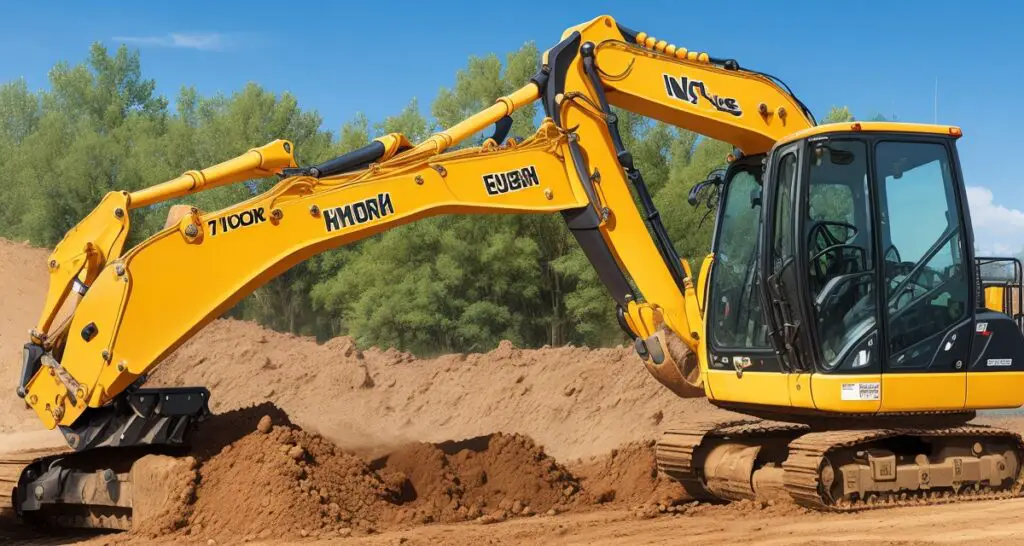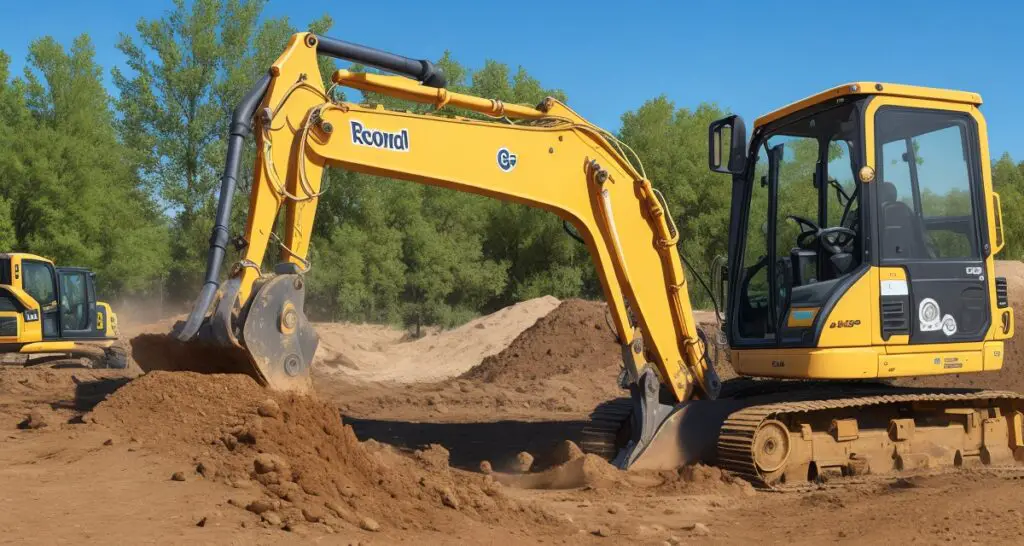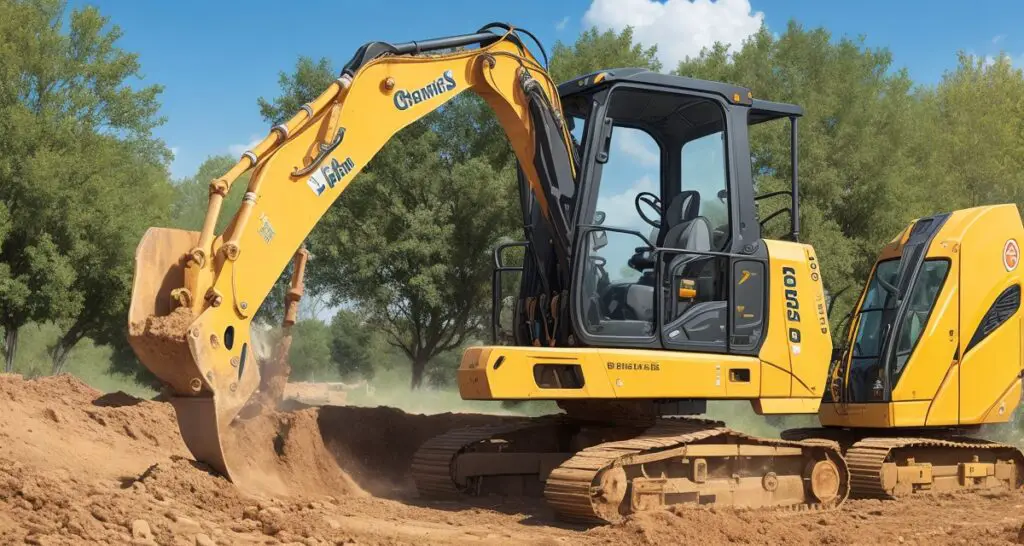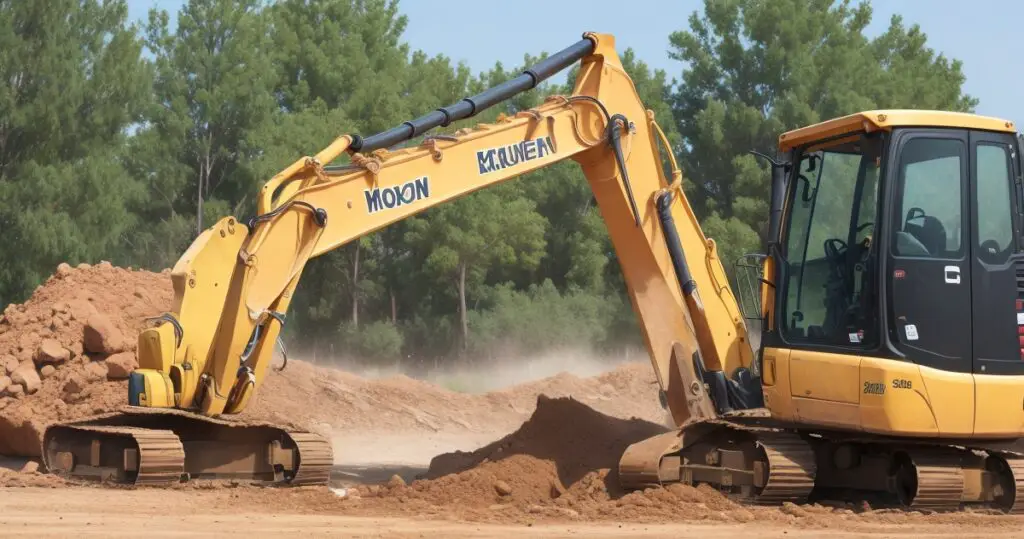When embarking on construction projects, whether big or small, one crucial question that often arises is, “How much does a mini excavator cost?” Mini excavators have become indispensable tools in the construction industry, thanks to their versatility and efficiency in digging, trenching, and other earthmoving tasks. Understanding the cost of acquiring a mini excavator is essential for budget planning and project feasibility.
In this article, we will delve into the various factors that influence the price of mini excavators, helping you make informed decisions when it comes to this important investment in your construction endeavors.
The Indispensable Role of Excavators in Construction:
Picture embarking on a construction project without the might of excavators at your disposal. The very thought of excavating, breaking rocks, or efficiently handling waste without these formidable machines seems almost insurmountable. Indeed, excavators stand as the linchpin of construction endeavors, playing an irreplaceable role in large-scale digging and the execution of a diverse range of construction tasks. Beyond sheer functionality, they embody the essence of efficiency, significantly expediting project timelines while simplifying the most intricate of construction challenges.
The Value of Excavators:
Are excavators an absolute necessity on a construction site? In the realm of construction, the answer resounds with an affirmative echo. Virtually every construction undertaking encompasses a substantial amount of excavation work, from digging foundations to trenching, and beyond. The excavator, with its formidable capabilities, emerges as an invaluable ally, rendering complex tasks not only achievable but also cost-effective and time-efficient.
When contemplating the role of excavators, consider the substantial savings they usher in. Time, often the most precious currency on a construction site, is in ample supply when excavators are on the scene. Tasks that might otherwise be labor-intensive and time-consuming are executed with remarkable swiftness and precision. This translates into reduced labor costs and accelerated project timelines, which ultimately translate into substantial financial savings.
Understanding the Cost of Excavators:
The pivotal question that arises in the quest for an excavator is the cost associated with this indispensable piece of construction equipment. Excavator costs are influenced by a multitude of factors, including their type, size, make, model, and whether they are new or used.
For new excavators, the investment can span a wide range, typically falling between $50,000 to $500,000 or even more for larger and specialized models. The price tag reflects not only the sheer power and advanced features of the equipment but also the reassurance of reliability and a manufacturer’s warranty.
Opting for a used excavator can present a more budget-friendly avenue, with prices ranging from $20,000 to $200,000, depending on factors like age, condition, and hours of operation. While used excavators may lack the luster of brand-new models, they often represent a sensible choice for cost-conscious contractors seeking efficiency without the premium price tag.
d. Exploring Excavator Rental:
To buying, another avenue to consider is excavator rental. Renting an excavator offers flexibility, particularly for projects where long-term ownership may not be necessary. Rental rates can range from $200 to $1,000 or more per day, depending on the size and type of excavator. Monthly rates may also be available, offering cost-effective solutions for varying project durations.
How Much Does a New Excavator Cost?

Navigating the Price Spectrum of New Excavators:
The realm of new full-size excavators unveils a diverse pricing spectrum, reflecting the interplay of various factors that shape their cost. Generally, new full-size excavators are a substantial investment, ranging from $100,000 to $500,000 or even higher. These price differentials are influenced by an array of considerations, offering a nuanced perspective on the acquisition of these formidable construction assets.
Factors Influencing New Excavator Prices:
1. Brand and Performance:
The brand of the excavator plays a significant role in determining its price. Renowned brands with a history of reliability and advanced technology often command higher price tags. The excavator’s performance capabilities, such as digging depth and lifting capacity, can influence its cost.
2. Size:
The size of the excavator is a defining factor in its price. Smaller excavators, typically weighing between ten and 15 tons, are more budget-friendly, with prices ranging from $75,000 to $150,000. However, the final cost can be further influenced by the choice of accessories and attachments.
3. Mid-Size Excavators:
For those seeking a mid-sized excavator, falling within the weight range of 15 to 20 metric tons, the cost typically ranges from $100,000 to $200,000, and sometimes more. The versatility and capabilities of mid-size excavators make them a popular choice for a wide range of construction tasks.
4. Full-Size Excavators:
When it comes to full-size excavators, typically weighing between 30 and 40 tons, the investment becomes more substantial. Expect to allocate between $150,000 to $500,000 for a machine of this caliber. The higher price tag is reflective of the increased power, reach, and capacity these excavators bring to large-scale projects.
In essence, the price range of new excavators is a dynamic landscape shaped by factors like brand reputation, size, and the specific needs of the construction project. Whether seeking affordability in smaller models or the robust capabilities of full-size excavators, the construction industry offers a wide range of options, each tailored to deliver efficiency and value for the discerning contractor.
New Excavator Pros and Cons

The Advantages of New Excavators:
New excavators, despite their substantial price tag, bring a multitude of advantages to the table that can make them a compelling choice for construction professionals seeking top-tier performance and reliability.
1. Maximum Power:
One of the standout benefits of new excavators is their unmatched power. These machines are equipped with the latest technology and engineering advancements, translating into superior digging force, precision, and speed. This power empowers operators to tackle even the most challenging excavation tasks with ease and efficiency.
2. Top Efficiency:
Efficiency is a hallmark of new excavators. They are designed to optimize workflow, reduce downtime, and enhance productivity on the construction site. Cutting-edge hydraulic systems, ergonomic controls, and advanced features ensure that each operation is carried out with precision and minimal effort.
3. Better Fuel Consumption:
New excavators are engineered with fuel efficiency in mind. Modern engines and innovative fuel management systems are designed to maximize power output while minimizing fuel consumption. This not only translates into cost savings but also aligns with sustainability goals by reducing environmental impact.
4. Reliability and Durability:
New excavators are backed by manufacturer warranties, providing peace of mind to operators and contractors. These warranties often cover a range of components and systems, ensuring that any unexpected issues are promptly addressed. The build quality of new excavators enhances their longevity and durability, reducing the risk of breakdowns and repair costs.
While the initial investment in a new excavator may be substantial, these machines offer a high return on investment through enhanced performance, reduced operational costs, and increased project efficiency. They are particularly well-suited for large-scale construction projects where power, reliability, and efficiency are paramount.
How Much Does a Used Excavator Cost?

Exploring the Cost-Efficiency of Used Excavators:
While new excavators offer a multitude of advantages, there’s no denying their substantial cost. This financial hurdle often leads construction professionals to explore the enticing world of used excavators, where cost savings beckon. Used excavators can indeed offer significant discounts, ranging from 25% to 50% off the original price, making them a compelling alternative for budget-conscious contractors.
Pricing Dynamics of Used Excavators:
The price range for used excavators is diverse, reflecting factors such as age, condition, and usage. To put it into perspective, new excavators commonly fall within the $100,000 to $500,000 bracket, while their used counterparts typically range from $50,000 to $250,000. This considerable price reduction extends a lifeline to construction professionals seeking cost-effective solutions without compromising on essential capabilities.
Influence of Usage Hours:
Usage hours serve as a key determinant in the pricing of used excavators, directly influencing their cost. Consider the following scenarios:
A medium-sized excavator with 2,500 hours and five years of use may command a price ranging from $50,000 to $100,000, contingent on its condition and maintenance history.
Opting for a two-year-old mid-sized excavator with fewer hours on its record can entail an expenditure between $75,000 to $125,000, mirroring its relative freshness and preservation.
The Hours-Price Dynamic:
The number of hours logged by a used excavator profoundly shapes its price trajectory. For instance, a ten-year-old Cat 345B excavator with 4,000 hours on its clock might fetch around $200,000. However, if the same machine has endured over 10,000 hours of rigorous use, the price undergoes a significant reduction, ranging from $75,000 to $125,000.
This aspect underscores the importance of scrutinizing usage hours when evaluating used excavators. It not only influences the cost but also serves as a gauge of the machine’s wear and tear, influencing its potential longevity and maintenance requirements.
In essence, used excavators represent a cost-efficient gateway into the world of construction machinery. The significant price discounts they offer, coupled with a wide range of options, make them an attractive proposition for contractors seeking budget-friendly solutions that still deliver the power, efficiency, and reliability required for successful project execution.
Used Excavator Pros and Cons
HOW MUCH DOES A MINI EXCAVATOR COST?

a. The Pros and Cons of Purchasing a Used Excavator:
Opting for a used excavator presents both advantages and disadvantages, forming a nuanced landscape that demands careful consideration for contractors and construction professionals.
b. Advantages of Buying a Used Excavator:
1. Budget-Friendly:
The primary advantage of purchasing a used excavator is its affordability. For those working with budget constraints, the cost savings can be substantial. With used excavators typically priced at a fraction of their new counterparts, contractors can acquire the necessary machinery without breaking the bank.
2. Availability of Options:
The used excavator market offers a wide range of options, allowing buyers to select from various makes, models, and sizes. This diversity facilitates finding a machine that aligns with specific project requirements and budgetary constraints.
c. Disadvantages of Buying a Used Excavator:
1. Performance and Efficiency:
While cost-effective, used excavators often lag behind new ones in terms of performance and efficiency. The cutting-edge technology, enhanced features, and optimized design found in new excavators translate into superior digging power, precision, and speed. Consequently, used excavators may not match the productivity and effectiveness of their newer counterparts.
2. Maintenance Costs:
Used excavators may incur higher maintenance costs compared to new ones. As machinery ages, wear and tear become more pronounced, necessitating repairs and component replacements. These maintenance expenses, over time, can accumulate and offset the initial cost savings of purchasing a used excavator.
3. Uncertainty About History:
When buying a used excavator, there is a degree of uncertainty regarding its maintenance history and operational conditions. It’s crucial to thoroughly inspect and assess the machine’s condition to avoid unexpected breakdowns and repair costs.
Common Uses
a. The Ubiquitous Role of Excavators in Industry and Construction:
Excavators, renowned for their versatility and power, find their niche across a broad spectrum of industrial and contractor needs, with applications as diverse as the projects they serve.
1. Small Housing Projects:
In the realm of small housing projects, excavators prove invaluable for executing cut and fill tasks. These tasks involve the strategic excavation of soil from one area (cut) and the relocation of that excavated material to another (fill). Excavators enable precision and efficiency in shaping the terrain and laying the foundation for residential structures.
2. Marine Structural Works:
Excavators make a splash in the realm of marine structural works, particularly when it comes to the placement of large rocks and armors. Their robust capabilities extend to handling these massive elements, ensuring the stability and durability of structures such as breakwaters, seawalls, and harbor installations.
3. Large Construction Sites:
For large construction sites, excavators are indisputable workhorses, undertaking an array of critical tasks. Their scope of responsibilities encompasses excavation to create foundations and utilities, material handling to transport construction materials, and waste removal to maintain a clean and organized worksite. These tasks collectively contribute to the seamless execution of massive construction projects.
b. Factors Influencing Excavator Usage:
The method and location of an excavator’s utilization hinge on several factors, each playing a pivotal role in decision-making:
1. Excavator’s Purpose:
The specific purpose for which an excavator is required significantly influences its deployment. Whether it’s precision excavation, heavy-duty digging, or material handling, the excavator must align with the task at hand.
2. Brand and Model:
The brand and model of the excavator play a key role in determining its suitability for a particular task. Established brands often come with a reputation for reliability, advanced technology, and compatibility with various attachments.
3. Excavator Type:
The type of excavator selected, whether a long-reach excavator for extended reach or a skid steer for maneuverability, should match the requirements of the project.
In essence, the dynamic role of excavators in various industrial and construction contexts underscores their adaptability and indispensability. These versatile machines embody precision, power, and mobility, making them pivotal contributors to the successful execution of projects of all scales and scopes.
Full-Size vs. Mini-Excavators
Excavators, recognized for their versatility, come in a spectrum of configurations, each finely tuned to address specific project requirements. The choice between heavy-duty giants and nimble miniatures hinges on the nature of the task at hand. Let’s delve into these excavator categories to gain a deeper understanding of their capabilities:
a. Full-Size Excavators: Powerhouses for Heavy-Duty Tasks
1. Purpose:
Full-size excavators stand as the quintessential workhorses of construction and industrial projects. Their robust design and substantial power make them well-suited for tackling large-scale excavation, earthmoving, and material handling tasks.
2. Characteristics:
These excavators are characterized by their formidable size, high digging depths, and substantial lifting capacities. They typically weigh between 30 and 40 tons, and their reach extends to meet the demands of substantial projects.
3. Applications:
Full-size excavators shine in heavy-duty tasks such as foundation digging, road construction, large-scale landscaping, and mining. Their versatility allows them to excel in an array of challenging environments and terrains.
b. Mini Excavators: Precision Instruments for Smaller Jobs
1. Purpose:
Mini excavators, also known as compact excavators, are designed for precision and efficiency in confined spaces. They excel in tasks that require precise digging, trenching, and soil excavation.
3. Characteristics:
Mini excavators exhibit a compact and agile design, making them highly maneuverable in tight spaces. They typically weigh between 1 and 7 tons, striking a balance between power and mobility.
3. Applications:
Mini excavators find their niche in residential construction, landscaping, utility installations, and urban development projects. Their ability to navigate tight quarters and minimize site disruption makes them indispensable for smaller-scale jobs.
c. Micro Excavators: Micro Marvels for the Most Delicate Tasks
1. Purpose:
Micro excavators, as the smallest members of the excavator family, specialize in the most delicate and intricate tasks. They are ideal for ultra-precise digging, landscaping, and small-scale excavation.
2. Characteristics:
Micro excavators are the tiniest in size, typically weighing less than 1 ton. Their compact dimensions enable access to extremely confined spaces and offer minimal ground disturbance.
3. Applications:
These micro marvels are commonly used in residential gardens, urban landscaping, and interior demolition projects. Their ability to navigate through doorways and tight alleys makes them indispensable in environments where larger machines cannot tread.
In essence, the diverse configurations of excavators cater to the varied needs of construction and industrial projects, ensuring that the right tool is available for the right task. Whether you’re embarking on a monumental construction endeavor or carefully sculpting a small garden, the world of excavators offers a tailored solution to meet your project’s demands with precision and efficiency
Mini-Excavators: The Featherweights of Efficiency
Mini-excavators, also affectionately known as compact excavators, carve out their niche in the world of construction machinery through their modest weight. These nimble machines, typically weighing less than seven metric tons, embody efficiency, precision, and adaptability. Let’s explore the distinctive characteristics and advantages that define mini-excavators:
1. Ideal for Smaller Job Sites:
Mini-excavators are the darlings of compact job sites, where space constraints and confined quarters are the norm. Their compact size and maneuverability make them indispensable for projects that demand precision in tight spaces.
2. Landscaping Prowess:
Landscaping projects often require delicate excavation and trenching, precisely the kind of work that mini-excavators excel at. Whether you’re digging trenches for piping, creating intricate contours, or crafting garden features, these mini marvels deliver with finesse.
3. Zero or Near-Zero Tail Swing:
A standout feature of mini-excavators is their zero or near-zero tail swing design. This design enhances maneuverability and operator comfort, particularly when working in close proximity to structures and around buildings. With a mini-excavator, you can navigate confined spaces without the constant worry of accidental damage.
4. Safety and Precision in Utility-Rich Environments:
Projects situated amidst a network of underground gas lines, pipes, and utilities demand a cautious touch. Mini-excavators offer a safety advantage in such scenarios. Their compact size and precise control minimize the risk of accidental damage to critical underground infrastructure, ensuring both the project’s success and the safety of the surrounding environment.
In essence, mini-excavators, with their compact stature and precision capabilities, are a testament to the adage that “good things come in small packages.” They represent the ideal choice for projects that require a deft touch in confined spaces, offering both efficiency and safety as they navigate the intricate dance of construction and landscaping in tight quarters.
Full-Size Excavators: Unleashing the Power for Commercial Construction
Full-size excavators, occupying the weight class ranging from seven to 45 metric tons, represent the heavyweights of the excavator realm. These formidable machines are the go-to choice for commercial construction projects that demand raw power and robust hauling capabilities. Here’s a closer look at the attributes that define full-size excavators and their suitability for commercial endeavors:
1. Unmatched Hauling Capacity:
Full-size excavators are distinguished by their exceptional hauling capacity, making them a formidable force in handling hefty construction tasks. Their substantial power and lifting prowess equip them to tackle a wide spectrum of demanding projects with ease.
2. Versatile Work Tools:
These workhorses of construction come equipped with a diverse array of work tools and attachments. This versatility allows operators to adapt the excavator to the specific requirements of various projects, enhancing productivity and efficiency.
3. Productivity Enhancement:
Much like their smaller counterparts, mini-excavators, full-size excavators prioritize ease of operation and control. This translates to improved operator comfort and heightened productivity, ensuring that complex construction tasks are executed efficiently.
4. Challenges in Tight Spaces:
Despite their formidable capabilities, full-size excavators do face limitations when it comes to maneuverability in tight spaces. The dimensions, tail swing, and reach of these excavators can pose challenges when operating in confined work sites. Their size may interfere with nearby structures, potentially resulting in unintended damage.
5. Commercial Construction Prowess:
Full-size excavators shine brightest on the stage of commercial construction. These robust machines are tailor-made for projects that demand uncompromising power and versatility. From digging foundations and moving substantial quantities of material to executing precision earthwork, full-size excavators prove their mettle in the most challenging of construction endeavors.
Elevating Your Project with Trusted Excavator Brands:
Choosing the right excavator brand is pivotal in ensuring your project’s success, whether it involves trenching, dredging, excavation, earthmoving, or demolition. Opting for a brand with a stellar reputation can elevate your project’s efficiency and performance. Here’s a glimpse of some top excavator brands to consider for your next venture:
1. Caterpillar (CAT):
CAT excavators are synonymous with durability and reliability. Renowned for their robust construction and cutting-edge technology, CAT excavators are trusted workhorses in the construction industry. Their expansive lineup covers everything from compact models to heavy-duty giants.
2. Komatsu:
Komatsu excavators are lauded for their advanced engineering and innovative features. Known for their fuel efficiency and operator comfort, Komatsu offers a comprehensive range of excavators suitable for various applications, from urban construction to mining.
3. Hitachi:
Hitachi excavators are celebrated for their power and precision. Their impressive digging capabilities and robust build make them a top choice for heavy-duty projects. Hitachi’s commitment to quality and performance is reflected in their excavators.
4. Volvo:
Volvo excavators are synonymous with innovation and sustainability. They prioritize eco-friendly design and fuel efficiency without compromising on power. Volvo’s excavator range is designed to reduce environmental impact while enhancing productivity.
5. Kubota:
Kubota is a trusted name in compact excavators. Their mini excavators are revered for their maneuverability, ease of operation, and reliability. These compact machines excel in landscaping, residential construction, and utility work.
6. Hyundai:
Hyundai excavators combine affordability with performance. They offer a range of excavators suitable for different project scales. Hyundai’s commitment to quality and value makes them a competitive choice in the excavator market.
7. JCB:
JCB excavators are known for their versatility and adaptability. Their innovative designs cater to a wide array of applications, from urban construction to agriculture. JCB’s focus on ergonomics and technology enhances operator comfort and productivity.
8. Bobcat:
Bobcat specializes in compact excavators designed for agility and precision. These nimble machines are ideal for small-scale excavation, landscaping, and utility work. Bobcat’s compact excavators are renowned for their ease of operation.
Caterpillar Excavators: A Pinnacle of Excellence
Caterpillar, often affectionately referred to as CAT, is a name that resonates with construction professionals worldwide. This venerable brand has earned its status as one of the most prominent and trusted names in the excavator industry. Here’s a closer look at why Caterpillar excavators stand out:
1. Technological Advancements:
Caterpillar continually pushes the boundaries of innovation by integrating cutting-edge technology into their excavators. Features such as air conditioning and smartphone connectivity enhance operator comfort and efficiency, making the work environment more enjoyable and productive.
2. Emphasis on Safety:
Safety is paramount in any construction endeavor, and Caterpillar prioritizes this aspect in their excavator designs. Their excavators are equipped with the latest safety features to ensure that operators are protected in hazardous conditions, contributing to accident prevention and enhanced peace of mind.
3. Durability and Reliability:
CAT excavators are renowned for their robust construction and longevity. These machines are built to withstand the rigors of heavy-duty construction work and challenging environments, ensuring they endure years of demanding tasks with minimal downtime.
4. Operator-Friendly Design:
Ease of operation is a hallmark of Caterpillar excavators. The ergonomic cabin design and intuitive controls enhance operator comfort and efficiency, reducing operator fatigue during extended work periods.
5. Heavy Lifting Excellence:
Caterpillar has a rich history as a pioneer in the heavy equipment industry, and their excavators reflect this heritage. They are trusted workhorses for heavy lifting and demanding construction tasks, consistently delivering exceptional performance.
Case Excavators:
For those who demand precision, longevity, operator comfort, and raw power in their excavators, the Case brand is a resounding choice. Case excavators are emblematic of control, durability, and performance excellence, making them a standout brand in the construction industry. Here’s a closer look at what sets Case excavators apart:
1. Comprehensive Product Line:
Case offers an extensive product line, covering a wide spectrum of excavation needs. From earthmoving to specialized tasks, their excavators cater to diverse construction requirements, ensuring there’s an ideal fit for every job.
2. Exceptional Durability:
Case excavators are built to endure. Their robust construction ensures they withstand the harshest work environments, minimizing downtime and contributing to long-term cost-effectiveness.
3. Operator-Centric Comfort:
Case prioritizes operator comfort, recognizing that an empowered operator translates to enhanced productivity. The ergonomic cabin design, intuitive controls, and advanced features create a comfortable working environment, reducing operator fatigue during extended shifts.
4. Versatility and Power:
Case excavators excel in versatility and power. Their machines are engineered to deliver exceptional performance across a broad range of tasks, making them valuable assets for tackling multifaceted construction projects.
5. Notable Mid-Range Excellence:
The Case brand boasts remarkable mid-range excavators like the CX210C. These machines strike a balance between power and maneuverability, catering to a broad array of construction needs. Their versatility ensures they are well-suited for various applications, from excavation to material handling.
Additional Accessories for Excavators and Cost
Excavators, regardless of their size or type, can be transformed into multifunctional workhorses through a variety of attachments. These add-ons augment their capabilities and versatility, enabling them to tackle a broader spectrum of tasks. Here’s an exploration of some common excavator attachments and their roles:
1. Augers:
Augers are indispensable for drilling holes in the ground quickly and efficiently. They are commonly used for tasks like setting fence posts, planting trees, or installing foundations.
2. Thumbs:
Thumbs, also known as hydraulic thumbs or grapples, provide excavators with a firm grip on objects. They are essential for tasks like material handling, demolition, and debris removal.
3. Buckets:
Buckets come in various shapes and sizes, each tailored to specific excavation tasks. Standard buckets are used for digging, while specialized buckets like trenching or grading buckets excel in their respective applications.
4. Compactors:
Compactors are utilized to compress soil, gravel, or other materials to create a solid, even surface. They are commonly used in road construction and earthworks.
5. Couplers:
Quick couplers allow for swift attachment changes, enhancing efficiency on the job site. Operators can switch between attachments without leaving the cabin, saving time and effort.
6. Grapples:
Grapples are versatile attachments used for grasping, lifting, and moving bulky materials such as logs, rocks, or debris.
7. Hammers:
Excavator-mounted hammers, also known as hydraulic breakers, are used for breaking hard materials like concrete or rock. They find application in demolition and construction projects.
8. Rippers:
Rippers are used for breaking up hard or compacted surfaces, such as frozen ground or asphalt. They prepare the ground for further excavation or construction.
Each of these attachments comes with an Cost, which varies depending on factors like size, type, and brand. The versatility they bring to excavators significantly expands their utility, making them adaptable to an array of tasks. Construction professionals often invest in a combination of attachments to maximize the efficiency and functionality of their excavators, ensuring that these machines are ready to tackle any challenge on the job site.
19. FAQS;
FAQ 1: What is the average cost of a mini excavator?
The average cost of a mini excavator can vary significantly depending on factors like brand, size, features, and attachments. On average, you can expect to pay between $20,000 to $40,000 for a new mini excavator.
FAQ 2: How much does a used mini excavator typically cost?
Used mini excavator prices can range from $10,000 to $30,000 or more, depending on factors like age, condition, and hours of operation. Older models with higher hours tend to be more affordable.
FAQ 3: Are there financing options available for purchasing a mini excavator?
Yes, many equipment dealers and manufacturers offer financing options for purchasing a mini excavator. These options can help spread out the cost over time, making it more manageable for buyers.
FAQ 4: What are some key factors that can influence the price of a mini excavator?
Several factors can influence the price, including the brand, size (tonnage), attachments, and whether it’s new or used. Features like cab comfort and advanced technology can also affect the cost.
FAQ 5: How much do attachments for a mini excavator cost?
Attachments for mini excavators can range from a few hundred dollars to several thousand dollars each, depending on the type and complexity of the attachment. Common attachments include buckets, augers, thumbs, and hydraulic hammers.
FAQ 6: Are there any ongoing costs associated with owning a mini excavator?
Yes, there are ongoing costs, including maintenance, fuel, insurance, and possibly financing payments if you choose to finance the purchase. It’s essential to factor these costs into your budget.
FAQ 7: Is it more cost-effective to rent or buy a mini excavator for a specific project?
The decision to rent or buy a mini excavator depends on the project’s duration and frequency of use. For short-term or occasional use, renting may be more cost-effective. For long-term or frequent use, purchasing might offer better value in the long run. It’s essential to evaluate your specific needs and project requirements to make an informed decision.
20. Conclusion;
In summary, the cost of a mini excavator is influenced by various factors, including brand, size, attachments, and whether it’s new or used. New mini excavators typically range from $20,000 to $40,000, while used ones can vary from $10,000 to $30,000 or more based on their age and condition. Financing options are available to facilitate the purchase process. It’s crucial to assess your specific project needs and budget to make an informed decision, considering both the initial cost and ongoing expenses like maintenance and fuel.

